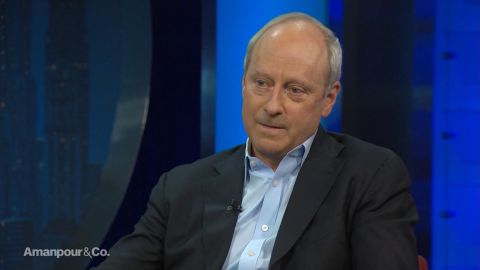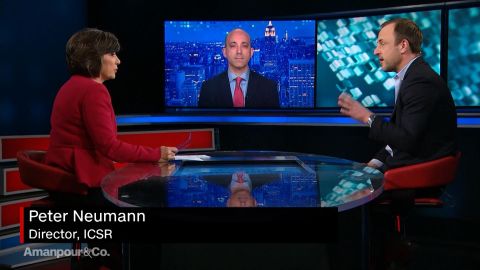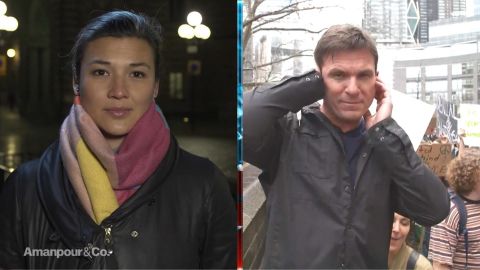Read Transcript EXPAND
CHRISTIANE AMANPOUR: Our next guest says, the art of listening is becoming extinct. Michael Sandel is a political philosophy professor at Harvard and he told our Hari Sreenivasan that unless we unplug our ears and our minds, we will lose the ability to reason or argue on issues that shape our political arena, such as climate and immigration and gun violence and a whole myriad of difficult but urgent issues.
HARI SREENIVASAN, CONTRIBUTOR: We’re at a place where people don’t even talk about politics anymore. They just say you know what, I’m not going to engage if I want to continue to have this relationship with my friend or my neighbor or my relative. How can this be changed?
MICHAEL SANDEL, LAW SCHOOL PROFESSOR, HARVARD: Well, the only way to change it is to fundamentally change the terms of public discourse. What passes for political argument these days consists of shouting matches on cable television and talk radio, ideological food fights on the floors of Congress. And this I think is why citizens are so frustrated with politics, with politicians. I think it animated a lot of the sense of anger and resentment that led to the election of Trump. We’re seeing this not only in the U.S. but in democracies around the world. It’s the emptiness, the hollowing out that we’ve seen in recent decades of the terms of public discourse. People want politics to be about big things, including questions of values. What makes for a just society? What should we do about rising inequality? What do we owe one another as fellow citizens? There’s precious little talk about those topics today and that’s what it would take I think to revitalize public discourse, and for that matter, democracy.
SREENIVASAN: You’ve said that the progressive left has sort of missed really the underlying tensions that fueled the president into office. What are those tensions?
SANDEL: I think the success of Trump and of right-wing populism generally is usually the failure of progressive politics. The mission, the purpose traditionally of center-left or progressive political parties, the mission has been to tame capitalism, to hold economic power to Democratic account, and to promote the dignity of workers. Now, if you look at the Democratic Party in the last few decades, it hasn’t really been about those things. The Democratic Party today is more closely aligned with the professional classes than with the working class and middle-class voters that traditionally constituted its base and its reason for being. And I think this is partly because during the ’90s and in through the 2000s, the Democratic Party, and this is true of center-left parties in Europe as well, cast their lot with a kind of market-driven version of globalization with the deregulation of the financial industry. And when this resulted in widening inequality, and a sense of disempowerment, and a growing role for big money in politics, the Democratic Party did very little about those problems. And I think that’s why the progressive parties, generally center-left parties, have been discredited in the eyes of many ordinary citizens.
SREENIVASAN: Right. So let’s take a topic that is in the news right now, immigration. What should we be talking about versus what we are talking about?
SANDEL: When workers feel that their country cares more about cheap goods and cheap labor than it does about the job prospects of its own people, there’s a sense of betrayal. And I think liberals and progressives have failed to appreciate that as they’ve gone headlong from the — over the last few decades promoting free trade agreements and deregulation, including the financial — welcoming the financialization of the economy, they’ve missed the sense of betrayal. They’ve missed the legitimate grievances associated with the resentments that have arisen.
SREENIVASAN: It seems the president has picked up on that far better than the Democrats, even have the capacity to. I mean we are getting — when he says — multiple campaign rallies, he says what is a country without borders?
SANDEL: Right. Well, he is addressing this question though, a kind of xenophobic nationalism that is dark and dangerous but he is addressing it. And the way to respond I think is not simply to say any talk about the moral significance of borders is racist or xenophobic. The way to address it is to offer an alternative vision of what it means to be members of the national political community. Patriotism in recent decades has become increasingly the property so to speak of the right. There’s no reason in principle why that has to be. So I think that liberals and progressives need to articulate a sense of national community, of civic obligation, of pride in country that addresses people’s hunger for a politics of the common good, sense of membership and belonging to provide an affirmative inspiring alternative to the strident nationalism and xenophobia that Trump’s sense of national community takes.
SREENIVASAN: Where do the Republicans come out in all this? Have they done a good job about this?
SANDEL: By and large, the Republican Party has been taken over by Trump. I don’t mean so much in terms of personnel but in terms of ideology and political rhetoric. So I think one of the tragedies of this moment has been the weakness I’ve spoken about the problems the Democrats have had in offering an alternative vision. But another part of the tragedy is the failure of the responsible voices within that the Republican Party to voice a robust criticism of Trump.
SREENIVASAN: I remember the quote that Ronald Reagan had in his Oval Office farewell speech.
(BEGIN VIDEO CLIP)
RONALD REAGAN, FORMER PRESIDENT OF THE UNITED STATES: I have spoken of the shining city all my political life but I don’t know if I ever quite communicated what I saw when I said it. But in my mind, it was a tall proud city built on rock stronger than oceans, windswept, God-blessed, and teeming with people of all kinds living in harmony and peace. And if there had to be city walls, the walls had doors, and the doors were open to anyone with the will and the heart to get here.
(END VIDEO CLIP)
SREENIVASAN: That is very different than where the Republican ideas of immigration are today, both for immigrants and for refugees. It’s a big shift in a very short period of time.
SANDEL: It is. And I think that as we are searching for a sense of national community for sources of unity that seem in scare supply, I think we shouldn’t underestimate the contribution to the common good of Syria’s regress debates. What we’re lacking is not a green light or consensus on this or that issues. I don’t think that’s our problem. What we’ve lost is the art of Democratic argument, the ability to reason together and argue together about big questions like justice and the common good and the meaning of citizenship. Because those — being able to disagree, but on the basis of civility and mutual respect, that is what holds a pluralist society like ours together. And it also involves the art of listening, listening not just for the words that are being spoken by the political opponent, but listening for the convictions and the principles that lie behind the passions and the opinions that the opponent may have. This art of listening is a civic art that we need to recover.
SREENIVASAN: From Robert Reich to Steve Bannon, there are predictions that this is going to get worse before it gets better, that there is going to be even greater unrest, a greater fracturing. Is that inevitable?
SANDEL: Well, it’s not inevitable. Though, it may be likely. I think that the Democrats have made a mistake to pin their hopes on the Mueller report, the expectation that he will deliver a legal verdict that will resolve the problem of the Trump presidency as the Democrats see it. I think impeachment would be a mistake, not because I think this president is fit for office, but because I think it’s important that he be repudiated by the voters, not impeached which inescapably would be seen as a leap politicians trying to get rid of a guy they couldn’t beat in an election. So I think it’s very important that Democrats resist the temptation to spend the next two years on impeachment. There’s another reason it would be risky for Democrats. It will distract them from developing an affirmative, inspiring politics of persuasion of their own. Preoccupying themselves with Trump and his misdeeds is too easy an excuse for Democrats. Well, he’s terrible, he’s violating democratic and constitutional law, all that may be true and yet, less Democrats and progressives find a way to speak convincingly to the resentments and the grievances and the frustrations of ordinary voters. They’re not going to be able to defeat him in the next election.
SREENIVASAN: One of those grievances is that we, as a country, have sold a meritocracy for a long time. Work hard, play by the rules. You can get ahead. In fact, we share stories often about the exceptions versus the rule. And we’re now heading into a period where this is one of the first generations who are not going to do better than their parents on average. And I think and if you break it down by quintiles, the lowest quintile has a four percent chance of ever getting to the top.
SANDEL: Right.
SREENIVASAN: But we still all want to believe that you can make it with just hard work.
SANDEL: Right.
SREENIVASAN: That there’s — as soon as people figure out that that’s not the case, that’s a pretty deep frustration.
SANDEL: There’s also a damaging message that this preoccupation with meritocracy gives about the attitudes towards the success of those who land on top. The message it sends is you land on top, that as your own doing. You don’t owe anybody else for that.
SREENIVASAN: And the inverse.
SANDEL: Exactly.
SREENIVASAN: If you aren’t successful, this failure is of your own doing as well.
SANDEL: It’s of your own doing. And so this attitude toward success, which is bred by a focus on meritocracy, upward mobility, scrambling up the ladder even as the rungs grow further apart, it has a toxic effect on our attitudes toward success. And if I believe I’ve succeeded, thanks to my own doing. It’s very hard for me to look at someone else in my society less fortunate and say there — but for accident or the luck of the lottery or the grace of God, it’s harder and harder to say that if the successful inhale so deeply of their own success, they believe they’ve done it on their own. And this is corrosive of solidarity, of commonality, with the sense that we are all in this together. It’s corrosive of democratic citizenship.
SREENIVASAN: But it seems we’re caught up more in moral victories than anything else. I mean we could legislate our way through practical solutions to problems but we want to score a point and we want to make sure the other guy or gal doesn’t. We’re almost locked into the structure that we have because we can’t agree that it needs to change.
SANDEL: One of the most damaging effects of the inequality of recent decades is that we are losing those common spaces and public places in everyday life. I call it the skyboxification of American life, thinking back to sports stadia and the fact that when I was growing up going to a baseball game or — brought people together. There was class mixing. Whereas now we have these skyboxes where the affluent can watch in air- conditioned comfort and not have to stand in long lines for the restroom. But this is happening throughout our society. There are fewer occasions of class mixing. Those who are affluent and those who are of modest means live and work and shop and play in different places. We send our children to different schools. And this is damaging to democracy. Democracy doesn’t require perfect equality. But what it does require is that people from different backgrounds, different walks of life, bump up against one another in the course of their everyday lives because this is how we learn to negotiate and to abide our differences. And this is how we come to care for the common good. So one of the big tasks in revitalizing politics is to revive public neighborhoods, and parks, and recreation centers, and public transportation, cultural facilities, and above all the public schools that bring people out of their segregated privatized forms of community into a shared life a democratic citizenship. That’s a big project but wouldn’t it be refreshing if the two parties started debating ways of achieving that?
SREENIVASAN: Thanks so much for joining us.
SANDEL: My pleasure.
About This Episode EXPAND
As New Zealand reels from the worst terror attack in its history and police arrest a suspect from Australia, Kevin Rudd, former Australian Prime Minister, speaks to Christiane, and Peter Neumann, the founding director of the International Centre for the Study of Radicalisation and Political, and Jonathan Greenblatt, CEO of the Anti-Defamation League, discuss what is fuelling these deadly attacks.
LEARN MORE



